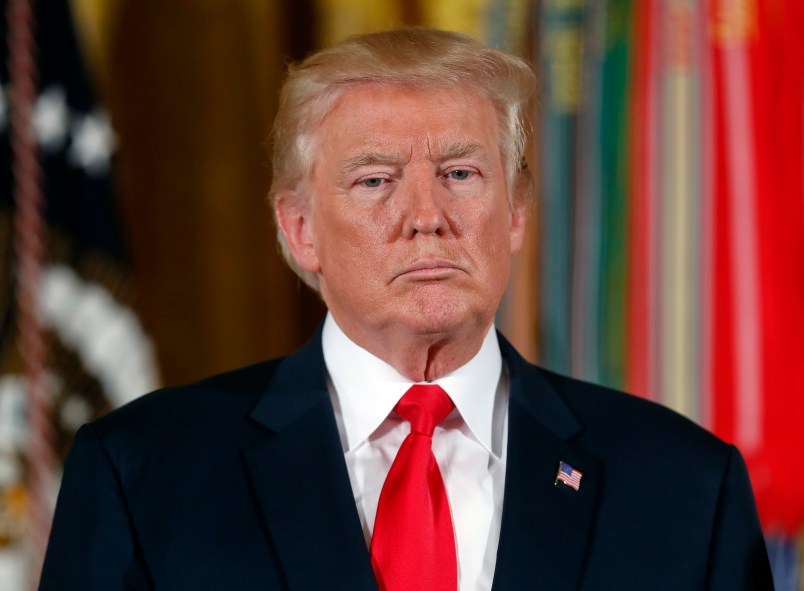As President Donald Trump mulls sabotaging Obamacare’s exchanges by cutting off billions in cost sharing reduction payments to insurers—payments that are the subject of an ongoing federal lawsuit that began when the Republican-controlled House of Representatives sued the Obama administration in 2014—a new court action this week makes it harder for him to unilaterally ending the subsidies.
On Tuesday night, the U.S. Court of Appeals for the District of Columbia Circuit granted a motion filed by 16 states—led by New York and California—who want to be intervening parties in the lawsuit around the legality of the payments. This means that even if Trump decides to drop the government’s defense of the insurer subsidies, the states can take up the mantle.
The payments, which clock in around $7 billion per year, help insurers cover low-income people with the severe health needs. Without them, insurers say they would have to drastically hike rates or leave certain areas altogether, potentially sending the market into a death spiral. The Obama administration defended the subsidies when the case first began, but after Trump took office it was no longer clear whether there would be a party to the case willing to fight for them.
New York Attorney General Eric Schneiderman, who in the motion argued that the Department of Health and Human Services can’t be trusted to represent his states’ best interest in court, said the ruling is “good news for the hundreds of thousands of New York families that rely on these subsidies.”
“It’s disturbingly clear that President Trump and his administration are willing to treat them as political pawns,” he wrote. “But this coalition of attorneys general stands ready to defend these vital subsidies and the quality, affordable health care they ensure for millions of families across the country.”
The state attorneys general intervening in the lawsuit are mostly Democrats, but even staunch conservatives on Capitol Hill have been pleading with the Trump administration to keep making the payments for now. Though Trump could still drop the appeal of the lawsuit or direct HHS to cut off the CSR payments, the court has now given states a way to challenge that decision.







Big win for #theresistance. Insurance co’s already won a case on the prior CSR withholding due to Rubio’s poison pill. They’ll win this one too, and we won’t have to rely on Ryan’s House GOP to handle the suit (which they would not do). First, the ACA imposed this burden on and made the promise to insurers, and states relied on those same promises to set insurance rates and deliver affordable insurance to their residents. Second, this clearly seems like a case where the Executive Branch is failing to faithfully uphold and execute the laws of the US. There is ample, documented evidence and intent of this. This isn’t about a restrictive interpretation of the law. This is about undermining the law itself.
How’s that whole wanna-be-a-dictator thing going for you, Con-man?
The Incredible Shrinking Presidency
The incredible thing PP’s behavior continues to reveal is how little he knows about government. He honestly believed the presidency is a dictatorship in which presidents can just do whatever they want and everybody has to bow their heads and go along with it. He was convinced that the problems the country faced was all because past presidents just weren’t tough, or whatever, enough. He still doesn’t understand that every president has been constrained by the Constitution, by the rule of law. He doesn’t know what it means to build consensus, that you can’t afford to alienate your caucus.
Obama took a lot of (stupid) shit from the left for not personally going after members of his own caucus when they wouldn’t bend to his will. What we’re seeing now, the fracturing of the Republican caucus, is precisely why that was such a stupid idea. And I believe that his relentless pursuit of bipartisanship, as much as he was criticized for it, makes PP look even smaller.
Hmm I wonder where in the world he could have got that false narrative-Fox News perhaps?